
Use the
included
insulating washers on the
rear rear of the video card to help
prevent scratching and
electrical shorting. Using the Koolance-supplied
screws, tighten each location to assemble the
video card and water block.
NOTE: The video card should be removed from the chassis in order to install this
cooling device. Most cards using the VID-series blocks are disassembled the same
way, although heat sink assemblies of any given model can vary.
1
4
CAUTION: Removal of the original heat sink or liquid cooling may void
your manufacturer’s hardware warranty. Please consult the manufac-
turer if unsure, and keep all original parts in case of a return/RMA.
!
Connecting Multiple VID Coolers
When connecting multiple VID coolers,
Koolance offers optional bridge blocks.
These minimize liquid routing while avoiding
potential conflicts with hardware in between
the video cards.
G 1/4 BSPP threaded fittings can be screwed into the top or bottom side of the
cooler, as long as coolant flows from one half to the other (left to right or right to
left).
With all screws removed,
carefully remove the GPU heat
sink, followed by the card heat sink.
Original thermal paste may present
resistance during removal.
VID-NX1080 Video Block Guide v 1.0
If using the optional
Koolance back plate:
before mounting the
back plate, tighten only
the 4 rear GPU screws
on the video card.
Then add the back
plate using the screws
that came with it.
For the video block and back plate, use the included
thumb nuts and screws to occupy empty mounting
locations on the video card. This helps to support the
video card and cooler assembly.
GTX 1080 Disassembly Screws (Bottom and Rear L-Bracket)
All heat sink assembly screws should be removed. There are
multiple screws on the rear of the video card, and 2 more on
the L-bracket.
Place the Koolance block onto
the video card so the mounting
screws will align.
VID-NX1080 Water Block Thermal Pad Locations
• If the GPU area paste is not evenly disrupted, thinner thermal pads may be
needed in corresponding areas to improve GPU contact.
• If thermal pads have no chip indentations but the GPU paste looks good,
thicker thermal pads may be needed to improve contact in those areas.
3
Optional
Koolance Back
Plate Thermal
Pad Locations
Multiple types of heat transfer pads are included with some
Koolance blocks. You might not require both (check the
pad diagram). This is done because card manufactures
change the component height tolerance from time to time.
After completing video block assembly, it’s recommended to
remove the block temporarily to check thermal paste and pad
impressions for good component contact:
After cutting the proper shapes for
your block, peel the protective film
from each pad.
Apply each thermal pad to the
water block as illustrated in the
provided thermal pad diagram.
Basically, any area of the video card in contact with the original heat sink will need
new heat transfer material. Place thermal pads on the corresponding areas of the
Koolance water block.
2
Thermal paste is only required on the main GPU.
The other areas will utilize the included heat
transfer pads.
Spread thermal compound on the GPU thinly and
evenly using the included paste packet, or a piece
of thick paper (such as a business card).
Unplug the heat sink fan wire. Remove the original RAM thermal transfer
material, and wipe any residual thermal material from the main GPU
chipset.
The thermal pad sheet should be cut into
pieces required for your video block contact
areas. Please use the diagram included
with your water block to determine the approximate sizes
needed. Koolance heat transfer pads can have different
thicknesses (0.5mm, 0.7mm, and 1.0mm).
If you purchased the optional Koolance back plate, apply thermal padding to the
back plate per its included diagram.
-
 1
1
Koolance VID-NX1080A User manual
- Type
- User manual
- This manual is also suitable for
Ask a question and I''ll find the answer in the document
Finding information in a document is now easier with AI
Related papers
-
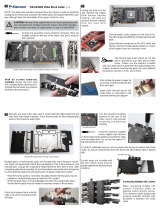 Koolance VID-AR290X User manual
Koolance VID-AR290X User manual
-
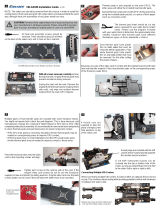 Koolance VID-AR699 User manual
Koolance VID-AR699 User manual
-
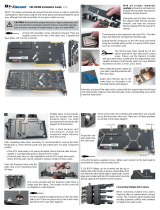 Koolance VID-NX980 User manual
Koolance VID-NX980 User manual
-
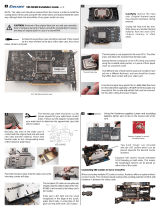 Koolance VID-NX460 User manual
Koolance VID-NX460 User manual
-
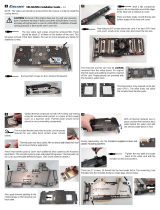 Koolance VID-NX295S User manual
Koolance VID-NX295S User manual
-
Koolance VID-AR295X2-R User manual
-
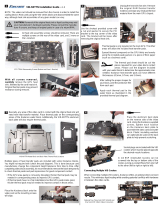 Koolance VID-NXTTN2 User manual
Koolance VID-NXTTN2 User manual
-
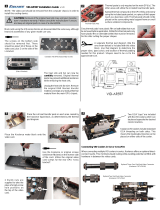 Koolance VID-AR597 User manual
Koolance VID-AR597 User manual
-
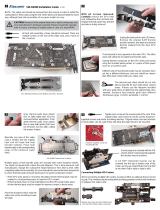 Koolance VID-NX690 User manual
Koolance VID-NX690 User manual
-
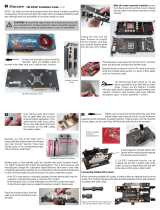 Koolance VID-AR697 User manual
Koolance VID-AR697 User manual









